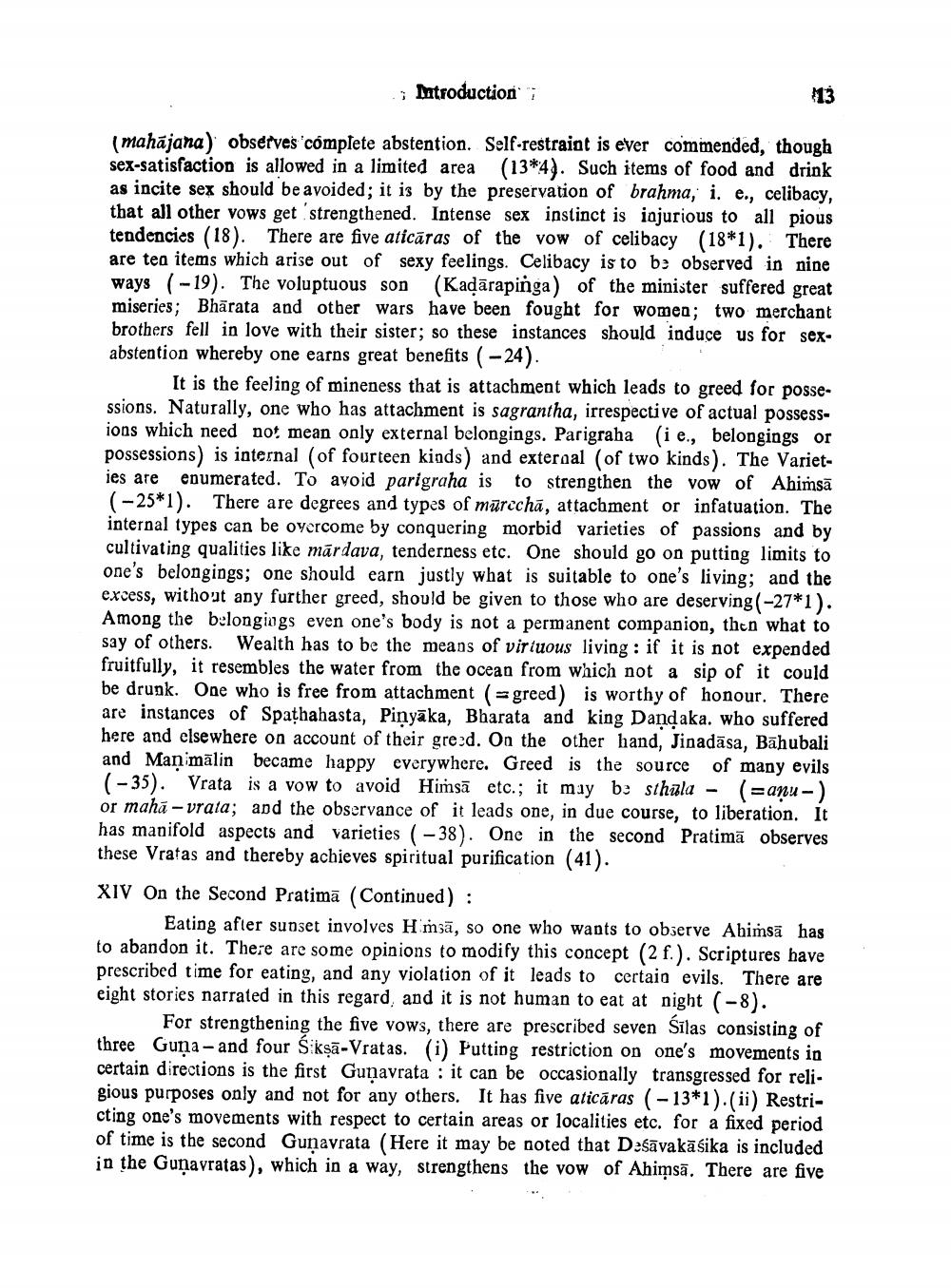________________
Introduction
13
(mahajana) observes complete abstention. Self-restraint is ever commended, though sex-satisfaction is allowed in a limited area (134). Such items of food and drink as incite sex should be avoided; it is by the preservation of brahma, i. e., celibacy, that all other vows get strengthened. Intense sex instinct is injurious to all pious tendencies (18). There are five aticāras of the vow of celibacy (18*1). There are ten items which arise out of sexy feelings. Celibacy is to be observed in nine ways (19). The voluptuous son (Kaḍārapinga) of the minister suffered great miseries; Bharata and other wars have been fought for women; two merchant brothers fell in love with their sister; so these instances should induce us for sexabstention whereby one earns great benefits (-24).
It is the feeling of mineness that is attachment which leads to greed for possessions. Naturally, one who has attachment is sagrantha, irrespective of actual possessions which need not mean only external belongings. Parigraha (ie., belongings or possessions) is internal (of fourteen kinds) and external (of two kinds). The Varieties are enumerated. To avoid parigraha is to strengthen the vow of Ahimsa (-251). There are degrees and types of marecha, attachment or infatuation. The internal types can be overcome by conquering morbid varieties of passions and by cultivating qualities like mardava, tenderness etc. One should go on putting limits to one's belongings; one should earn justly what is suitable to one's living; and the excess, without any further greed, should be given to those who are deserving (-27*1). Among the belongings even one's body is not a permanent companion, then what to say of others. Wealth has to be the means of virtuous living: if it is not expended fruitfully, it resembles the water from the ocean from which not a sip of it could be drunk. One who is free from attachment (greed) is worthy of honour. There are instances of Spathahasta, Pinyäka, Bharata and king Dandaka. who suffered here and elsewhere on account of their gre:d. On the other hand, Jinadasa, Bahubali and Manimalin became happy everywhere. Greed is the source of many evils (-35). Vrata is a vow to avoid Himsa etc.; it may be sthula (=anu-) or maha-vrata; and the observance of it leads one, in due course, to liberation. It has manifold aspects and varieties (-38). One in the second Pratimă observes these Vratas and thereby achieves spiritual purification (41).
XIV On the Second Pratima (Continued) :
Eating after sunset involves H msa, so one who wants to observe Ahimsa has to abandon it. There are some opinions to modify this concept (2 f.). Scriptures have prescribed time for eating, and any violation of it leads to certain evils. There are eight stories narrated in this regard, and it is not human to eat at night (-8).
For strengthening the five vows, there are prescribed seven Silas consisting of three Guna-and four Ska-Vratas. (i) Putting restriction on one's movements in certain directions is the first Gunavrata: it can be occasionally transgressed for religious purposes only and not for any others. It has five aticaras (-131).(ii) Restricting one's movements with respect to certain areas or localities etc. for a fixed period of time is the second Gunavrata (Here it may be noted that Desavakašika is included in the Gunavratas), which in a way, strengthens the vow of Ahimsa. There are five




